God King Bona could not stand any competition. She humiliated her unwanted daughter-in-law, insulted, and even tried to starve herself. She deliberately turned Elisabeth of Habsburg's existence into hell.
In 1530, despite the protests of Bona Sforza, her husband Sigismund agreed to his son's engagement with the Habsburg princess Elizabeth. The bachelor was only ten at the time. Future bride - three years old. Bona, a well-known, burning opponent of the Habsburgs, did not attach much importance to this defeat. She was convinced that a marriage contract at such a young age could later be dissolved or annulled, like dozens of such contracts between European courts. The queen's enemies expressed a similar opinion.
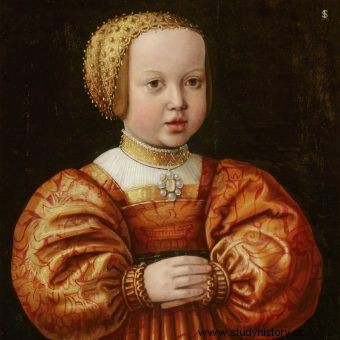
Elizabeth of Habsburżanka as a 4-year-old child. A portrait by Jakob Seisenegger from 1530
For them, the uncertainty of the marriage was a cause of constant anxiety. In 1538, a Prussian spy in Poland, Nicholas Nibschitz, wrote in a letter to his principal, Albrecht Hohenzollern:“The marriage with Elizabeth has not been decided so far, although so much has been arranged about it. God knows who will be dancing at this wedding. ”
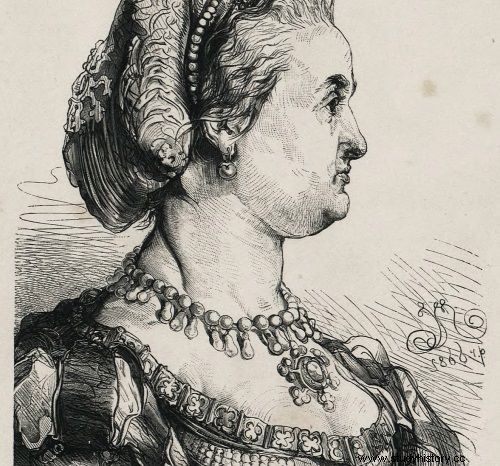
Bona at a mature age. A drawing by Jan Matejko.
An even more informed anonymous Habsburg agent spoke in the same vein:
Queen Bona, the great enemy of the Roman king, the most benevolent enemy of the German people and his open enemy, tries by all means to prevent the marriage from taking place.
By some strange tricks it tries to do this, countless obstacles are invented, so that even if something is made sacred by the MPs, later, over time, it is changed and discarded to did not work.
The decision of the decrepit old man
Bona did come close to breaking deals. She had already managed to significantly delay the wedding, and the next move was to cancel it. The Queen just missed one thing. The fact that she would lose any influence over her husband.
In the summer of 1538, two envoys from Vienna came to Krakow to finalize the wedding agreement. In their report they wrote:
We appeared before the [Polish] king in the small chamber where the king usually lives. Many gentlemen were present. The older king, with a gray beard, wore an ermine lined coat, and a cap on his head. He sat in a chair pale and exhausted; traces of fatigue and suffering were reflected on his face. He didn't say anything. He seemed like a statue or a silent person.
At that time, Zygmunt was over seventy-one years old. He was decrepit in body and mind. He nodded at everything and was incapable of changing any of his old decisions. He stopped, probably without realizing what he was agreeing to, also for the wedding of Sigismund Augustus with Princess Elizabeth of Habsburg.
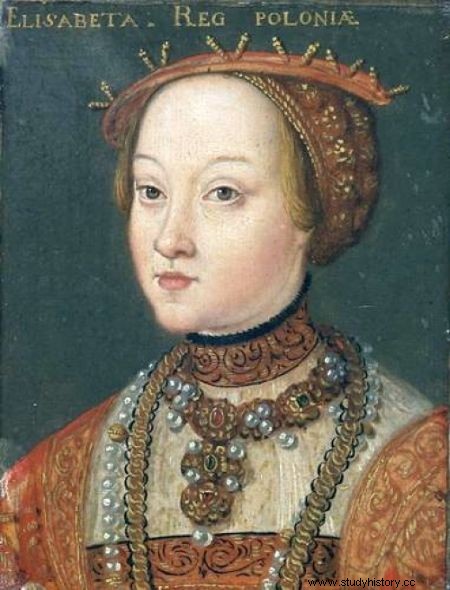
Elizabeth of Habsburżanka in a portrait from the 1650s
August was the beloved son of Bona; Elizabeth - the favorite child of the Archduke of Austria, King of Germany, Hungary, Bohemia and Croatia, Ferdinand Habsburg. The former was to remain at Wawel under the watchful eye of his mother. The latter from his father's tutelage was taken over by his greatest opponent. What would otherwise have been a mere political arrangement has turned into an extremely personal game.
The wedding between twenty-three-year-old Zygmunt August and seventeen-year-old Elizabeth took place on May 6, 1543. But whether the wedding night happened at the same time is not so certain.
"This is the contempt and humiliation I experience"
The young Habsburgian woman was a gentle, quiet, obedient and shy woman. A perfect wife according to the sixteenth-century expectations! And yet no one at the Polish court seemed delighted with her arrival.
Bona waited a whole week with handing over her daughter-in-law a wedding gift. This one turned out to be not very sophisticated and not very expensive necklace. Zygmunt August clearly avoided the bride during the wedding and the many-day games that followed. And then it only got worse.
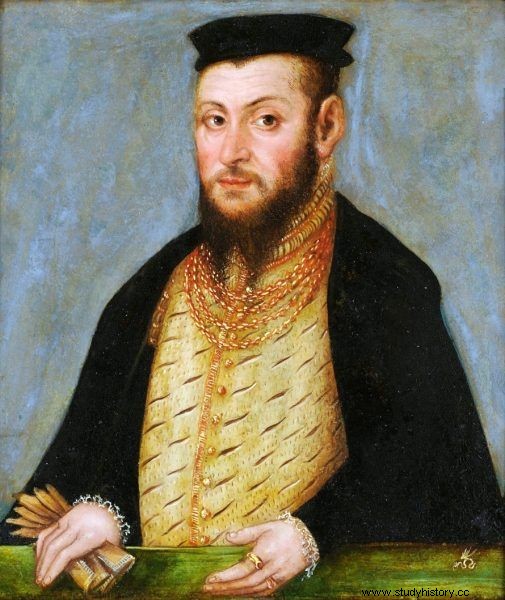
Portrait of Zygmunt August around 1553 from the workshop of Łukasz Cranach the Younger.
We know the situation down to the smallest detail thanks to a certain Jan Marsupin. It was a Habsburg diplomat and spy, sent to Krakow with Elizabeth to look after her, defend her interests and keep her company in a foreign place. Already in the first report sent to Archduke Ferdinand Habsburg, Marsupin timidly reported that the relationship between the bride and groom was not going well:"The young king is very afraid of your mother so far, so that he does not do anything or say anything without her."
A few days later, as if he preferred to wait for the Archduke to get used to the problem, the agent began explaining in detail:
Good Lord. To talk to the old king is the same as not to talk to anyone. The king has no will of his own, this is how he is held on the bit. Queen Bona has everything in her hand. Bona alone rules the whole state, gives orders to everything.
The young king does not say anything, he does not want to listen to anything and he does not dare to interfere in any matters, so he is afraid of his mother, Queen Bona. And I almost believe that this young king is influenced by his mother's spells, because every day (I hear) he visits her, from the first night until today.
It was not stated explicitly, but the last sentence explains the source of the problem. If Zygmunt August spent every day with his mother, he could not keep his wife company at that time. Another Habsburg agent wrote, moreover in a letter to Queen Bona herself:
We found out that sometimes thirty and forty days passed without His Majesty [Sigismund Augustus] having a closer relationship with His righteous spouse.
So kind, grateful and crowned with so many virtues and gifts, the Lady experiences such contempt and humiliation of heart.
Long list of complaints
According to a confidential message, the young couple's intimate life was going very badly. However, it is not really certain if it worked out at all. It is possible that the relationship was not consumed. And even if it happened on the wedding night, it certainly did not start a real marriage.
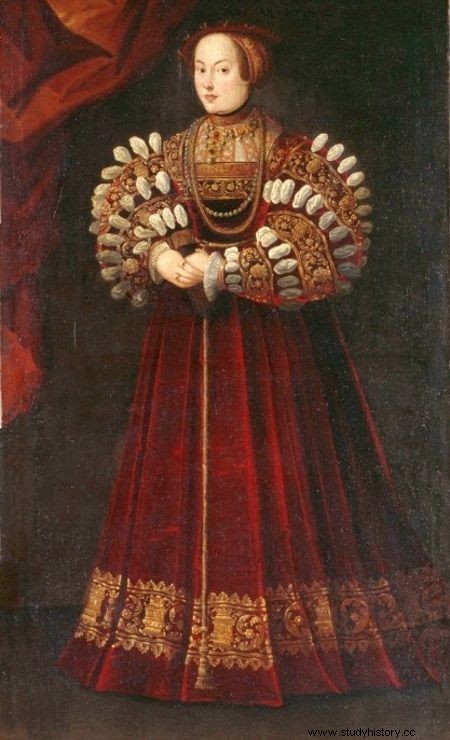
Elizabeth of Habsburżanka in a portrait made after 1542
As if that was not enough, Elżbieta, lost and not knowing Polish, was exposed to all sorts of insults. According to Marsupin, “no one dared speak to or visit Bright Queen Elizabeth. Neither the prince, nor the master, nor the nobleman, nor any of the commoners ”. She even had to eat alone, because the noble ladies of the court were afraid to expose Bona and keep her company, and the young king preferred to eat meals with his mother. The situation was made even worse by the submissive character of Elizabeth. "My God! She is so young yet, so shy. He does not have the courage to speak, he trembles at the sight of Bona and hardly dare to look at her, "Marsupine wailed.
Finally, however, the Habsburg agent could not stand it. He prepared a twenty-four-point list of complaints and, agitated by emotions, asked Bona's court for an audience. Of course, the queen did not accept him immediately. On the first day, he was informed that she was too busy. The second that she couldn't talk right now because she was taking the medicine. It was only the third that he was called, and only for a brief conversation around 4 p.m. During the day, the time was shifted, and Marsupin - fearing that the Queen might dismiss him again or leave the castle in the meantime - spent the whole day waiting outside the door to her apartments.
After dinner, Bona graciously agreed to let him in. She had a pale Elizabeth by her side, which did not make the task any easier for Marsupine. Nevertheless, he started.
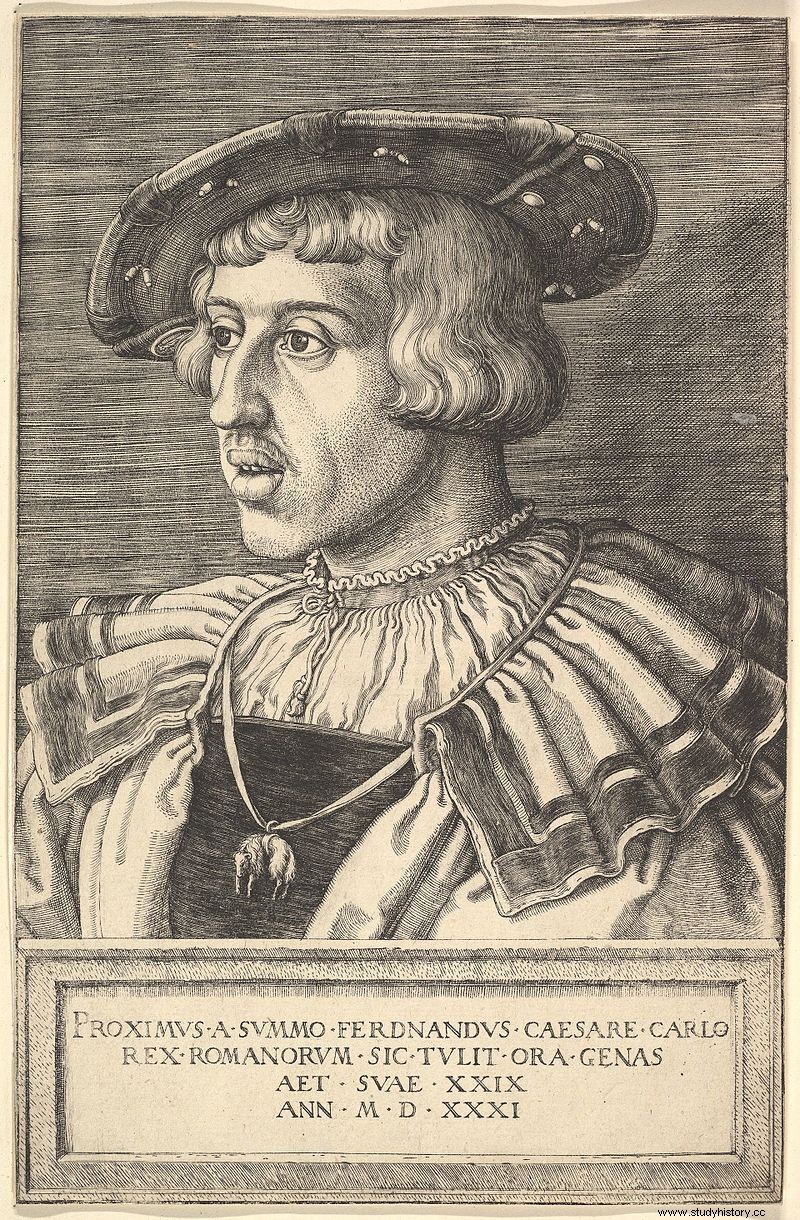
Ferdinand Habsburg. Elżbieta Habsburżanka's father
I asked her about the following things. Why does the young king never eat with his wife? Why does he never visit her on the day or give her any signs of love? Why does Her Majesty not order him to do it, when it is known that the king is only doing what she tells him to do?
Even supposing that [the young king] has friendly relations with other women, at least he should give his wife the duty. It is not fair and decent to deal with the daughter of the Roman king and the imperial niece. The emperor would not bear such an insult.
Starve or poison?
If the Habsburg agent hoped that winning Bona everything, bluntly, would improve the situation of the young queen, he was severely disappointed. Bona only cried theatrically and accused him of lying and of trying to organize a rebellion against her in Poland. And deep down she decided that she needed to get rid of Marsupin from Wawel as soon as possible.
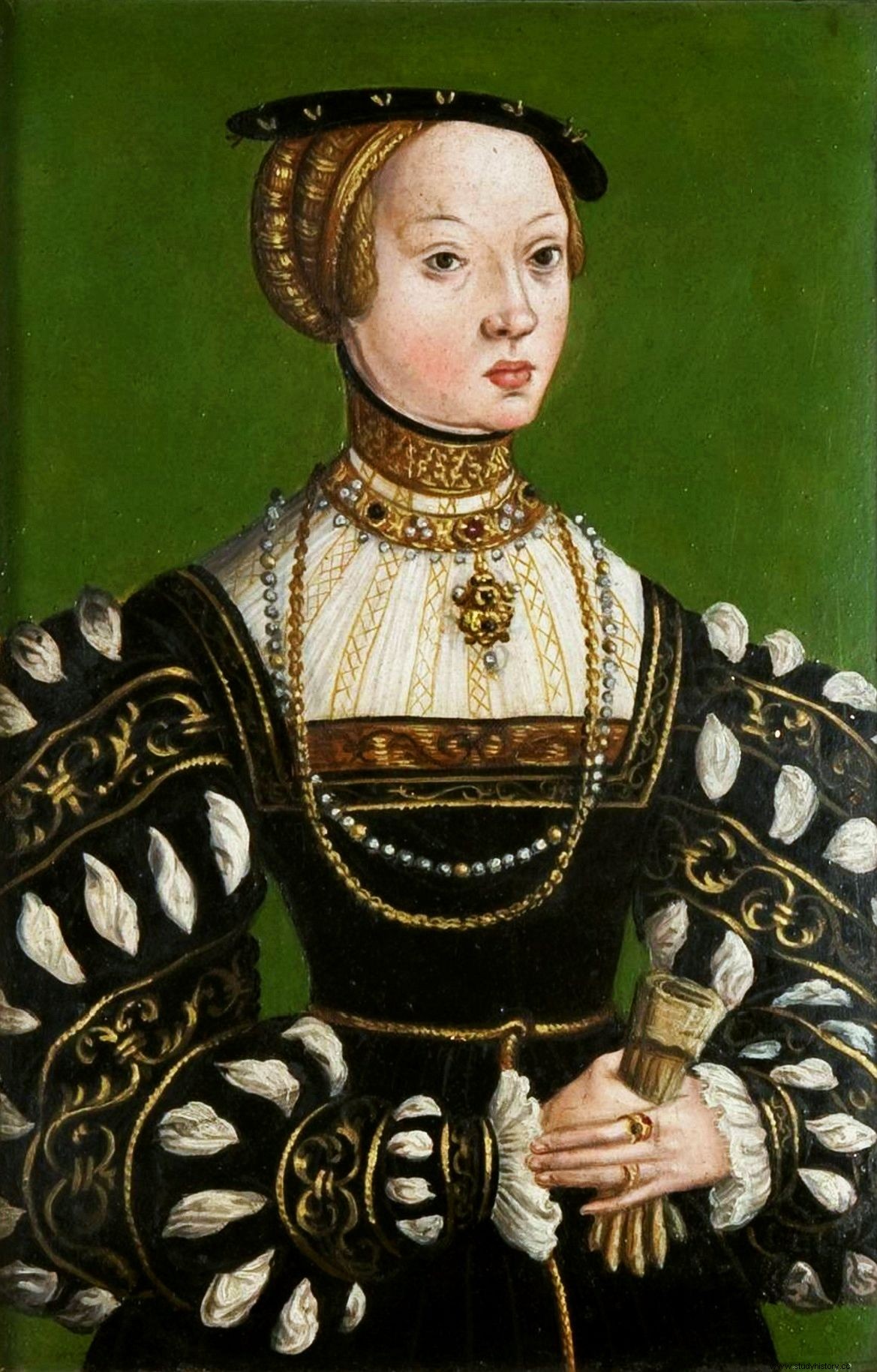
Elizabeth of Habsburżanka in an anonymous portrait
She quickly blew a scandal over rumors spread by a Habsburg agent. The so-called Parma cheese case came close to the royal council itself. And Marsupine? He was effectively isolated from Elizabeth, banished from the court, and finally - forced to retreat from the state. From then on, the queen had complete freedom of action. And she did not hide that she was going to poison Elizabeth's life completely.
Bona limited the contact of the younger queen with her husband, and humiliated her at every opportunity. It even happened that she subtly threatened her with death. The Bishop of Płock, Samuel Maciejowski, who was watching this, finally couldn't stand it.
"Everyone is under the impression that Your Majesty you want to starve this young queen!" - betrayed Bona. "So they think I want to poison her?" The queen replied, raising the bet immediately. Maciejowski was not going to lie. "They don't say it out loud, but they have it in their hearts and everyone is afraid of it," he admitted. Indeed, Bona was the mother-in-law of her worst nightmare. Perhaps even the first, now forgotten precursor to all stories about bad mother-in-law.
Source:
You can learn more about the confusing history of the Jagiellonian family in Kamil Janicki's book Ladies of the golden age (Horizon Label 2014). The article is based on the literature and materials collected by the author during the work on the book.
